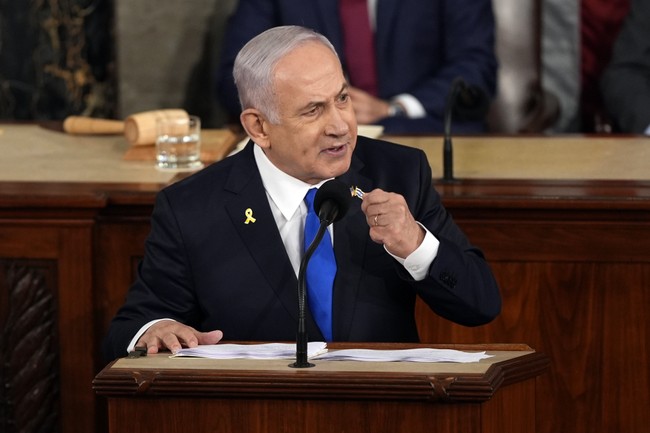
A shouting match ensued between Israeli Prime Minister Benjamin Netanyahu and Defense Minister Yoav Gallant on Thursday over whether or not to give up the Philadelphi corridor in the hostage negotiations with Hamas, according to reports. The details reveal a dramatic and interesting exchange between the two rivals where Netanyahu’s cunning wins again, but Gallant is left furious.
A look at their histories will show stark differences in opinions even though they both belong to the conservative party, the Likud. In March 2023, Netanyahu actually fired Gallant over his criticism of Bibi’s judicial reform and then reversed the decision in April after thousands of protestors filled the streets. Contentions between the two still remain.
Gallant has been mostly supportive of the war efforts but has criticized Netanyahu’s plans, or lack thereof, for Israel’s involvement in Gaza on the “day after.” Now they are disagreeing on whether or not to concede to Sinwar’s demands for the Philadelphi corridor in exchange for hostages.
Read related:
Blinken, Netanyahu Break Bread on ‘Bridging’ Ceasefire Deal Israel Can Live With
HEARTBREAKING: IDF Recovers Bodies of Six Hostages Executed by Hamas
When tensions arose during the cabinet meeting, Gallant accused Netanyahu of imposing his plans, and in response, Bibi banged his hands on the table and demanded a vote on the issue, according to a transcript from the meeting leaked to Israel’s Channel 12 and shared with the Times of Israel.
Gallant then replied, per a senior Israeli official, the Jerusalem Post reported, “The prime minister has the authority to bring any decision to a vote. Even to execute the hostages.”
Other ministers called for Gallant to leave, saying he went too far. In the past, usually, the ministers come to the defense of Gallant when he spars with Netanyahu, but this was the first time he was left alone.
A back-and-forth match resulted, as the Times of Israel story linked above said:
Gallant then told Netanyahu he would eventually cave to Sinwar’s demands anyway.
Netanyahu shot back that he doesn’t take directions from anyone.
Gallant accused the cabinet of abandoning the hostages by making the decision, adding he would vote against the measure.
He again turned to the premier and asked, if he had to decide between withdrawing from the Philadelphi Corridor or bringing back the hostage, which would he choose.
Netanyahu stressed that only a determined negotiating stance would bring back the hostages.
Pressed again on the question by Gallant, the prime minister said he was choosing to remain in the Philadelphi Corridor.
The interesting thing is, Mossad Director David Barnea, pointed out that the negotiations right now are not even fixated on this Philadelphi corridor, but rather on the list of hostages and prisoners to be released:
“There is no logic to this vote right now. In any case, the negotiations are currently focused on (other issues) and not the Philadelphi Corridor,” added Mossad spy agency director David Barnea, who has led the Israeli negotiating team.
Also, IDF Chief of Staff Herzi Halevi believes either way, it’s a non-issue because they can always go back in:
The IDF will know how to enter and return to the Philadelphi Corridor at the end of the first six weeks of the ceasefire. There are enough constraints in the talks, you don’t need to add another.
It seems that the other ministers were not keen on Netanyahu’s brash way of handling the situation, but the vote passed 8-1 with the only abstention from the far-right minister Ben Gvir, who thought it too weak because it would call for thinning IDF presence and he wants to maintain a full presence:
The Israel Hayom daily reported Friday that the decision’s content in practice calls for the IDF to gradually thin its presence along the corridor during the first six-week stage of a potential hostage-ceasefire deal, by the end of which only soldiers in watchtowers will be left along the Philadelphi Corridor.
Even though the presence would be thinned, IDF would still maintain control.
This debate highlights the rising division in Israel over how to handle the war, but mainly how no matter what Netanyahu does, he will be painted as the villain. He claims his strong stance is aimed at preventing weapons smuggling across the corridor that could reignite the terrorists who have largely been beaten down by the IDF. In his mind, the best way to protect the nine million Jews that live in Israel is to accomplish the war goal of destroying Hamas. Others, rightfully grieving, want the hostages at any cost.
The Hostage and Missing Families Forum has no neutral view of the minister:
“The quotes from the cabinet meeting should cause every Israeli citizen to lose sleep,” the forum said in a statement. “Every citizen should knows that if they are to be kidnapped from their bed in their pajamas on a Saturday morning, their prime minister will do everything to keep his seat, even at the cost of leaving them to die in the Hamas tunnels in Gaza.”
According to the Jerusalem Post, “The Prime Minister’s Office claimed that the chief of staff and the Mossad director did not express reservations about the vote. The IDF Spokesperson said they would not comment on statements made in closed classified meetings.”
What is hard for Israelis to consider in regard to the negotiations is that for every prisoner released, there is a chance that person will kill more innocent Israelis. Sinwar himself was released in a prisoner swap; so was the terrorist behind the murder of the 12 children playing soccer.
These decisions are not that easy, and Netanyahu has so far seemed to do a good job of staying firm amidst betrayal from his allies abroad, including the U.S., and merciless criticism within. The Philadelphi Corridor was a strategic win that brought Hamas to its knees. Israel is winning this war and can’t afford to make bad deals with terrorists who have proven not to keep their end of the bargain – if they agree at all.

